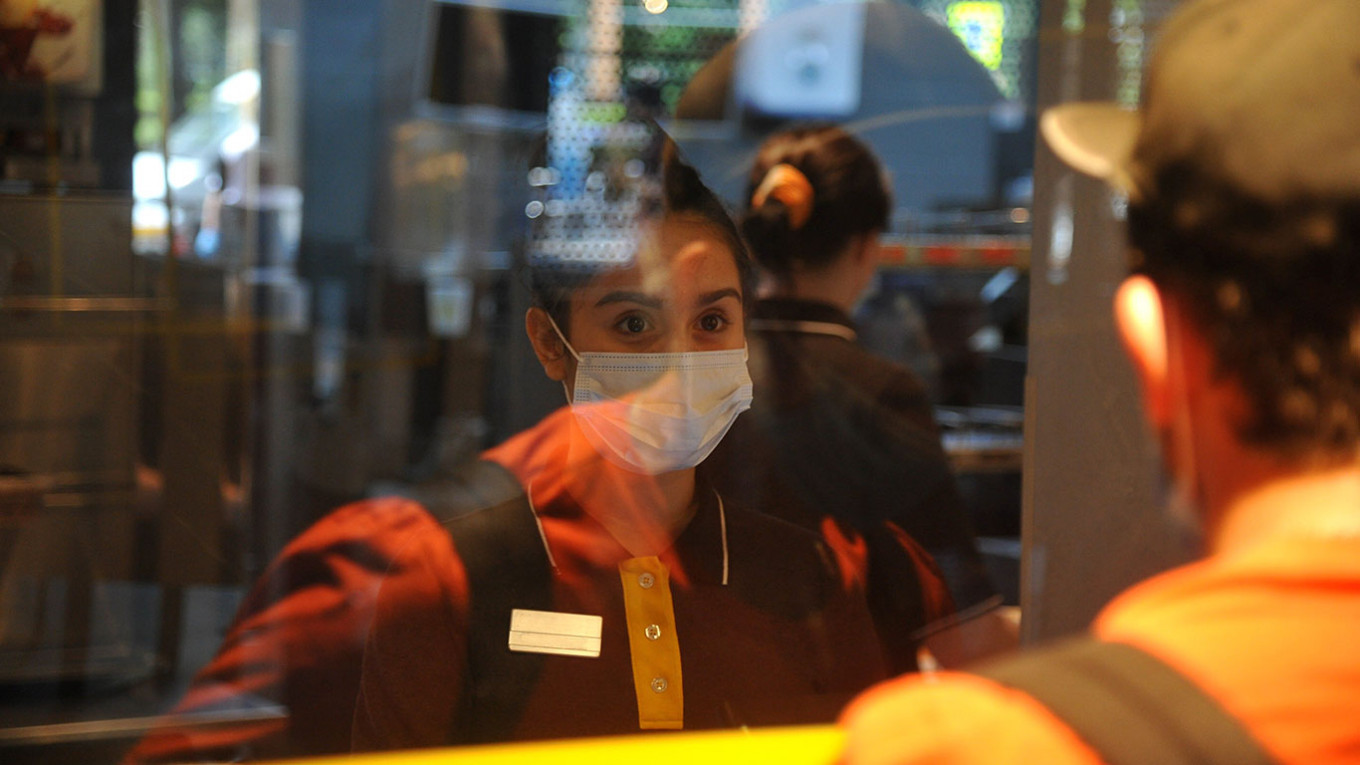For three weeks now, Russia has been setting records for daily deaths from the coronavirus. But even with more than 1,000 Russians dying daily and the Moscow mayor announcing a week-long lockdown in the city, on the capital’s streets panic is hard to detect.
“I just got the vaccination, but if it wasn’t for my business I probably wouldn’t have bothered,” said Anna Traktirova in her small coffee shop near the capital’s Kievsky railway station, where the steady stream of patrons are mostly unmasked.
With Russia’s coronavirus pandemic reaching previously unseen levels and Moscow’s new restrictions heralding the first return to lockdown since June 2020, the lack of urgency among most Muscovites reflects a country where two years of the coronavirus have normalized the pandemic as one more fact of life.
For Traktirova, the decision to get the jab was driven less by the city’s rising caseload than by new orders requiring Moscow service businesses to vaccinate at least 80% of workers to stay open.
“If I wasn’t worried about the cafe being shut down, I wouldn’t have got it,” she said.
Though Moscow is now set to return to strict coronavirus restrictions, including remote working, self-isolation for the unvaccinated and closures of almost everything except pharmacies and supermarkets, the bulk of the country’s pandemic has played out in an atmosphere of relative normality.
The Kremlin — reportedly wary of the economic costs and political unpopularity of lockdown measures — has chosen to steer clear of sweeping anti-virus action.
The country’s initial lockdown — which ended in June 2020 — was followed by a return to business as usual, amid periodic Covid-19 surges.
The result has been to effectively normalize the coronavirus as yet another fact of life.
According to an August poll by the independent Levada Center, 53% of Russians claimed not to fear contracting the virus.
The waters have been muddied still further by policy zig zags, with occasional attempts to reimpose restrictions beaten back by widespread public opposition.
In June, a move to make Moscow restaurants accessible only to those who presented a QR code proving their vaccination status was quickly scrapped, after the capital’s hospitality sector reacted angrily.
At the start of the autumn, sensitivities around the September State Duma elections saw action against Russia’s unfolding fourth wave postponed, as unpopular coronavirus restrictions were delayed until after election day.
The latest restrictions were announced during a televised meeting between President Vladimir Putin and regional officials, and accompanied by a personal appeal from an unusually emotional president.
“It’s strange that well-educated people, people with advanced degrees, don’t want to get vaccinated. We have a safe and effective vaccine,” said Putin, who has said he received Russia’s Sputnik V vaccine behind closed doors earlier this year.
“I call upon you to go out and get vaccinated. It's a question of your life and the lives of the people close to you.”
But with many Russians now deeply skeptical about the vaccine or subscribing to conspiracy theories about jabs, the president’s appeal appeared to be falling on deaf ears in Moscow.
“I’m absolutely not taking any vaccines,” said Alyona, an IT worker who has bought an illegal fake vaccination certificate and declined to give her full name.
“I’m not really that worried about the coronavirus, and I don’t trust the vaccines. I think they’ve been developed too fast,” she added.
With polls showing a consistent majority of Russians unprepared to get vaccinated, and one poll showing two thirds of respondents believing that the coronavirus itself is a manmade bioweapon, such opinions remain a more or less mainstream position almost two years into the pandemic.
“All my family are doctors, and they agree,” said Alyona.
With the government now announcing a nationwide paid “non-working week,” it remains unclear how effective new restrictions will be.
Previous unplanned anti-coronavirus holidays this year and last saw Muscovites take advantage of the time off to head the city’s parks, or jet off to the Black Sea resorts, largely defeating the holiday’s initial purpose.
With the observance of the holiday not obligatory, and the government only offering limited compensation to affected employers, many businesses outside the capital are expected to stay open regardless.
One survey by the SuperJob website suggested that 55% of employers would not observe the holiday, which may instead be limited to certain non-essential state sector workers.
Even in Moscow many reacted with resignation, numbed by almost two years of coronavirus news.
“Is that what they’ve announced?” asked coffee shop owner Traktirova, when told of the new lockdown.
“Well, I suppose we’ll just carry on as best we can.”
A Message from The Moscow Times:
Dear readers,
We are facing unprecedented challenges. Russia's Prosecutor General's Office has designated The Moscow Times as an "undesirable" organization, criminalizing our work and putting our staff at risk of prosecution. This follows our earlier unjust labeling as a "foreign agent."
These actions are direct attempts to silence independent journalism in Russia. The authorities claim our work "discredits the decisions of the Russian leadership." We see things differently: we strive to provide accurate, unbiased reporting on Russia.
We, the journalists of The Moscow Times, refuse to be silenced. But to continue our work, we need your help.
Your support, no matter how small, makes a world of difference. If you can, please support us monthly starting from just $2. It's quick to set up, and every contribution makes a significant impact.
By supporting The Moscow Times, you're defending open, independent journalism in the face of repression. Thank you for standing with us.
Remind me later.







